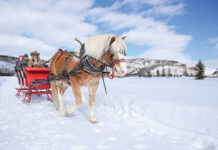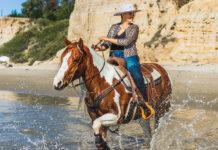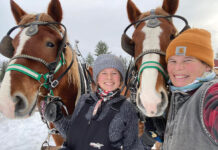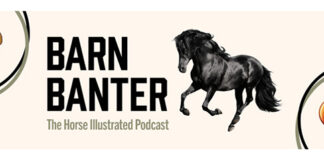Note: This is day four in my 30-day blogging challenge. What the heck is a 30-day blogging challenge? Read about it here.

I remember her once saying, “I probably couldn’t ride a horse now.” Then she paused for a moment, and added, “Well, maybe I could, if I could get a rocking chair up on the horse’s back.”
The importance of remaining physically active throughout your life is well-documented, and riding is more appealing to a lot of people than golf or t’ai chi will ever be. Unfortunately, it comes with a pretty high risk of injury compared with other activities, which undoubtedly causes a lot of senior citizens to look elsewhere for exercise.
A reader recently left a comment on an article here on HorseChannel asking if it was possible to learn to ride when you’re in your 70s and have back problems. We posted the question to Facebook to find out what people thought.
Predictably, the responses were overwhelmingly positive. Lots of people chimed in with their own stories of riding after back surgery or hip replacements. Other people talked about starting riding at various points throughout middle age and beyond. Some even said that riding alleviated their back pain. In general, it’s pretty encouraging.
Obviously, everyone is different, and there are conditions that will prevent a person from riding, no matter how strong their will or desire to get on the horse. And if you’ve been sedentary for your entire life, taking up riding at 75 is going to be challenging. But based on my own experience and the ideas contributed by our Facebook community, I think there are a lot of ways to ride in almost any physical condition.
- Ride a gaited horse. A lot of people suggested this idea, and I agree. If you have a bad back, riding a smooth-gaited Rocky Mountain Horse is going to be a lot more pleasant than a fancy, lofty Arabian or Thoroughbred. In general, if one of your reasons for riding is to stay active and get exercise, I’d argue that you’d want a trotting horse since posting is pretty good exercise, but for a beginner with a bad back or one who aspires to go for miles on the trail, I definitely get the appeal of the gaited breeds.
- Or ride a smooth-moving trotting horse. I’ve ridden a few different gaited breeds, but one of the smoothest rides I’ve ever experienced was on a retired western pleasure Quarter Horse. It took her all day to get around the arena once, but for a lot of beginners, I’m sure that’s not a bad thing.
- Drive a carriage. I have mixed feelings on this one, because I think riding in a cart is more jostling than sitting on a horse. But if you have access to a carriage intended for cross-country driving, it probably has a better suspension system than the show carts I’m used to. Plus, assuming you’ve got a well-trained horse at the end of the lines, driving nearly eliminates the risk of falling.
- Find a therapeutic riding facility. Even if you don’t have a documentable disability, some centers have able-bodied lesson programs in addition to equine-facilitated therapy, and they’ll be equipped to accommodate most any ailment you show up with.
- Work up to it. Whatever age you are, if you’re not particularly active, I think your life will be easier if you start doing some other forms of exercise before you start riding. Intense cardio or weightlifting are probably not necessary, but balance exercises would be a good place to start (here are some.)
I won’t lie. Getting old and the prospect of being physically unable to ride at some point is a bit terrifying to me. So I take my own advice and try to stay active, even during times when I can’t ride for one reason or another. What about you? How are you going to maximize your equestrian longevity? Tell me about it in the comments.
Back to The Near Side
Leslie Potter is Sr. Associate Web Editor of horseillustrated.com. Follow her on Twitter: @LeslieInLex.






I couldn’t agree more! At the age of 47 I picked up horses and riding after a 33 years lapse. I bought an arab mare and discovered she was in foal. I decided to keep the foal and trained her mostly myself. She’s now 6 years old and we are doing quite well together!
Great article! I’m riding a wonderful little Tennessee Walking horse at the age of 76. Smooth gaits are a plus, but there is something about a horse at any age which keeps us feeling younger. I have friends, who are my age or older who are riding, some even over jumps. And a couple didn’t start riding until they were 60.
I am 62 and have been riding since I was 7. I am still riding arabians and giving lessons bit no more training. My biggest fan and backer is my family doctor who says it’s great physically and mentally. After my stroke I didn’t need physical therapy I was told go ride and take care of your horse
I’m 61, have been riding since I was 9, started nursing school 6 months ago and I’m not about stop riding or making a dream come true. Age is a figment of one’s own imagination!
I am 64 and have just unsaddled my my American Quarter Horse. We had a lovely ride.
I totally get it!!! I am 60 – still riding and (ocasionally) showing. Don’t jump the big four-foot oxers anymore, but riding and being around horses is as much a part of me as my heart and lungs. Leather, fresh shavings, and hay are my perfume. The sound of horses munching, the sweet little nickers, snorts – the sounds of these glorious animals are the sounds of living. Riding is intoxicating and my life-giving drug. I’ll stop breathing before I stop riding and being around these magical creatures.
We have a 92-year old woman in our barn. She and her 30-year old Tennessee Walker retired from showing and winning multiple national championships only three years ago. Please check them out!?! http://fridayflyer.com/2015/03/06/a-woman-and-her-horse-nine-decades-of-passion
I ride a gaited horse and I drive a mini. The cart is fun. It is a pleasure cart and the ride isn’t bad at all. When I can’t ride anymore,I will stick with driving my mini.
RE: Ride a carriage – More older equestrians should consider this option when the rigors of being in the saddle start to take a toll. The median age of members of the American Driving Society is mid-fifties. The average age of the driver in the World Driving Singles in 2003 (haven’t researched other yeas) was 63. The show type jog carts referred to by the author were never made for any kind of driving than in a groomed ring or a smooth road. The majority of the carriage used today are direct descendants from the horse and buggy age where the primary goal was *comfort* while travelling. USEF would be wise to steer their aging riders who are considering hanging up their stirrups to try carriage drivng sports. They already know most of what they need to know. Having taught many, it’s an easy transition which can extend the involvement with horses for many years.
Correction to my previous comment: The average age of the drivers in the *2010* World Singles was 63.
Dear Mr. Shatner, I’m envious; I am only 58 & you’re running circles around me.
Here’s my problem. I broke my 5th lumbar into several pieces in 1991 & it never really healed. Nonetheless, I was back in the saddle by 1995 on ASBs Saddle Seat & Western, and Jumpers.) After that, the addition of 3 missing discs, making it too painful, I finally gave up in 2002. Having only recently lost both my mom, whom I took care of for 20 years to dementia, & husband to lung cancer, I’ve turned to the only thing I know, horses. I’ve been back in the saddle sporadically for a couple months (on an ASB & a ¼ horse,) and I’m trying to make an effort, but the combination of living alone & am unable to take any type of medication makes me terrified that something awful is going to happen.
Any suggestions or words of encouragement would be welcome.
V’lé
All articles about senior riders keep me going. I got my first horse when I was in my 20s and my third with my heart horse. Unfortunately, going through a divorce and a two-year-old child to raise I had to sell him. But over the years I have continued to take lessons and I’m still riding occasionally and looking forward to having a Morgan. I love these articles but they remind me to never quit